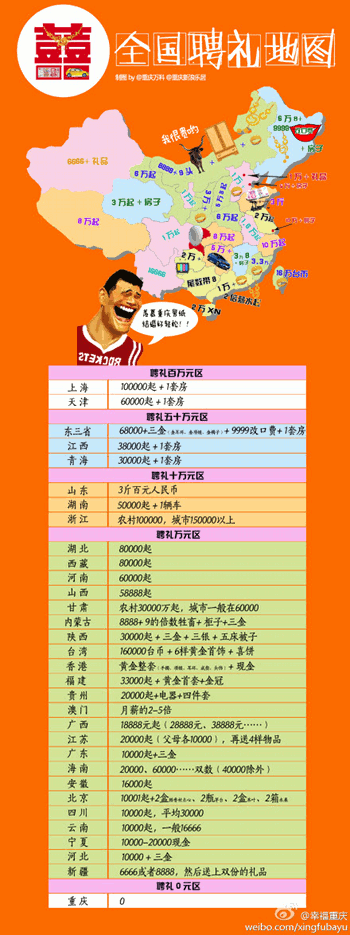 There’s no word of this causing any mass incidents yet, but a map illustrating how China’s rising real estate prices and booming economy are boosting the cost of matrimony indicates that the country’s rapid growth may be causing at least a few scattered cases of heartache.
There’s no word of this causing any mass incidents yet, but a map illustrating how China’s rising real estate prices and booming economy are boosting the cost of matrimony indicates that the country’s rapid growth may be causing at least a few scattered cases of heartache.
For those unfamiliar with the practice, a Chinese young man who wishes to marry, is usually expected to come up with a few “C”s before a young woman’s parents will give their OK. Those “Cs” commonly include cash and a condo, but may even include a few cattle.
The terms of these compensation expectations, and how they differ across the country was demonstrated recently in a bridal price map that went viral on the Weibo microblogging platform.
The map divides the country into five zones in terms of the amount expected by a bride’s family — the 1 million yuan (US$163,000) zone, the 500,000 yuan (US$80,750) zone , the 100,000 yuan (US$16,300) zone, the 10,000 yuan (US$1,600) zone, and the zero yuan zone.
The cities of Shanghai and Tianjin fall into the 1 million yuan (US$163,000) zone, the three provinces of northeastern China are within the 500,000 yuan (US$80,750) zone, while the provinces of Shandong, Hunan, and Zhejiang belong to the 100,000 yuan zone (US$16,300). Only Chongqing is classed as a zero yuan zone as the majority of residents do not ask for money, according to the map’s creator.
One of the major price drivers in this bride price is the cost of housing. In many parts of China, a man is expected to provide an apartment for his bride before her parents will consent to the marriage, and with average real estate prices in Shanghai reaching more than RMB 21,000 (US$3425) per square meter in May, a 100 square meter home would easily well exceed the bridal price figures cited for Shanghai.
In lesser developed spots like Inner Mongolia, guys can catch a break on their bride as a girl’s parents typically only expect RMB 8,888. However, before he gets hitched out on China’s big prairie, an Inner Mongolian groom will also need to come of with a quantity of cows that’s divisible by nine. Apparently the nine, 18, or 81 cows are for good luck and maybe even a few dairy products to support that matrimonial bliss.
Leave a Reply